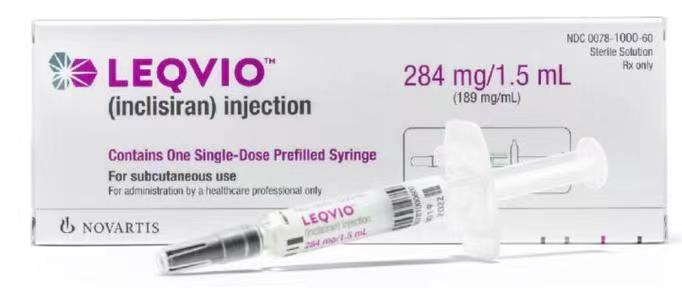On August 22, 2023, Novartis announced on its official website that its innovative siRNA drug, Incisiran Injection, has been approved for marketing by the National Medical Products Administration (NMPA). It is commonly known as Incisiran Sodium Injection and marketed under the brand name LeKe ®。 This is the first time that Inkslan Sodium Injection has been approved for marketing in China, with the approved indications being:
As an adjunctive therapy for diet, it is used for the treatment of adult patients with primary hypercholesterolemia (heterozygous familial and non familial) or mixed dyslipidemia, including: in patients who still cannot achieve LDL-C (low-density lipoprotein cholesterol) goals after receiving the maximum tolerated dose of statin therapy, using statin drugs alone or in combination with statin drugs and other lipid-lowering therapies, and in patients who are intolerant or contraindicated to statin drugs, using statin drugs alone or in combination with other lipid-lowering therapies.
The usage method is to inject booster needles 3 months after initial treatment, and then every 6 months thereafter. This plan is in line with the FDA and EMA approved Leqvio ® The usage and dosage are consistent in the United States and the European Union.

PCSK9 and lipid-lowering therapy
As the world's first siRNA lipid-lowering drug, Incisiran targets the mRNA encoding the pre protein converting enzyme Bacillus subtilis lysozyme 9 (PCSK9). PCSK9 is a secreted serine protease synthesized by the liver, which can bind to and degrade low-density lipoprotein receptor (LDL-R), reducing LDL-R's clearance of low density lipoprotein cholesterol (LDL-C) in serum. We all know that LDL-C is one of the four important indicators for clinical blood lipid detection. The higher the level of LDL-C, the higher the risk of suffering from atherosclerotic cardiovascular disease (ASCVD).
PCSK9 inhibitors can block the binding of PCSK9 protein to LDL-R in plasma (monoclonal antibodies), or directly block the synthesis of PCSK9 protein (siRNAs), thereby preventing the internalization and degradation of LDL-R, increasing the expression level of LDL-R on the cell surface, increasing LDL-R reuptake of LDL-C, lowering circulating LDL-C levels, and ultimately achieving the goal of lowering blood lipids. Previously, the PCSK9 inhibitors approved for marketing in China were all monoclonal antibodies, including Eoluzumab from Anjin/Anstailai, Aliciumab from Shengyuan/Sanofi, and Tolesizumab from Xinda Biotech.
The biggest difference between Incisiran and monoclonal antibodies is that it can directly act on the mRNA encoding PCSK9 protein, reduce mRNA levels through RNA interference, and thus reduce the expression of PCSK9 in the liver
Key milestones for Incisiran's launch
Incisiran was first approved for marketing in the European Union in December 2020 as a dietary adjuvant therapy for the treatment of primary hypercholesterolemia (heterozygous familial and non familial) or mixed dyslipidemia in adults;
In December 2021, it was approved by the US FDA to be listed as an adjuvant therapy for diet and maximum tolerable dose of statins, and used to treat adult heterozygous familial hypercholesterolemia (HeFH) or clinical atherosclerotic cardiovascular disease requiring additional reduction of LDL-C level;
In July 2023, a new indication was approved by the FDA as an adjuvant therapy for diet and statin therapy to reduce LDL-C levels in patients with primary hyperlipidemia, including HeFH.




